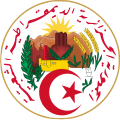Salka (Sufism)
 From Wikipedia - Reading time: 10 min
From Wikipedia - Reading time: 10 min
You can help expand this article with text translated from the corresponding article in Arabic. (December 2020) Click [show] for important translation instructions.
|
| Part of a series on |
| Algerian Islamic reference |
|---|
| Part of a series on Islam Sufism |
|---|
 |
|
|
The salka (Arabic: السلكة) is a collective recitation of all sixty hizbs of the Quran done by murids and saliks in Islamic Sufism.[1][2]
Presentation
[edit]The salka is a tilawa during the meeting of the murids in a zawiya or a mosque to continuously recite the entire Quran.[3]
Saliks and tolbas recite the salka periodically to demonstrate their memorization in the zawiyas and madrasas.[4][5]
Muslims used also to perform the salka to psalmody the whole Quran either for death, childbirth, marriage contract, or moving to a new residence.[6][7]
While the Hizb Rateb consists of reciting a juz' of the Quran before or after one of the obligatory Islamic salawate (prayer), the salka consists of meeting in a place where believers continuously recite all of the sixty hizbs of the Quran from Al-Fatiha to An-Nas.[8][9]
Variants
[edit]Depending on the season of the year, the salka can take two forms:[10]
- The Diurnal Salka (Arabic: السلكة النهارية), during the summer, when the length of the day is longer than that of the night.[11][12]
- The Night Salka (Arabic: السلكة الليلية), during the winter, when the duration of the night is longer than that of the day.[13][14]
See also
[edit]References
[edit]- ^ الحاج, محيي الدين شيخ الإسلام محمد/مولاي (1 January 2012). نوائل العوائد من رسائل الفوائد (كتاب يتحدث عن زيارة مقامات الأنبياء والأولياء) (من التراث الصوفي) (in Arabic). Dar Al Kotob Al Ilmiyah دار الكتب العلمية. ISBN 978-2-7451-7465-9.
- ^ معصر ،الدكتور, عبد الله بن محمد (1 January 2007). تقريب معجم مصطلحات الفقه المالكي (in Arabic). Dar Al Kotob Al Ilmiyah دار الكتب العلمية. ISBN 978-2-7451-5624-2.
- ^ أحمد, الهلالي المغربي/أبي العباس (1 January 2009). عرف الند في حكم حذف حرف المد في القراءات والتجويد (in Arabic). Dar Al Kotob Al Ilmiyah دار الكتب العلمية. ISBN 978-2-7451-6231-1.
- ^ رماح حزب الرحيم على نحور حزب الرجيم (تعاليم وآداب وأوراد الطريقة التجانية) 1–2 ج2. January 2019.
- ^ معصر ،الدكتور, عبد الله بن محمد (1 January 2007). تقريب معجم مصطلحات الفقه المالكي (in Arabic). Dar Al Kotob Al Ilmiyah دار الكتب العلمية. ISBN 978-2-7451-5624-2.
- ^ الخالدي ،الأستاذ, عبد السلام العمراني (1 January 2012). فهرسة العالم الرباني الكبير سيدي أحمد بن محمد بن عجيبة الحسني (in Arabic). Dar Al Kotob Al Ilmiyah دار الكتب العلمية. ISBN 978-2-7451-7143-6.
- ^ محمد, العربي الدرقاوي/سيدي (1 January 2009). رسائل مولاي العربي الدرقاوي المسماة بشور الهدية في مذهب الصوفية (in Arabic). Dar Al Kotob Al Ilmiyah دار الكتب العلمية. ISBN 978-2-7451-6291-5.
- ^ التمسماني ،الدكتور, محمد بن محمد المهدي (1 January 2006). الإمام سيدي محمد بن أحمد البوزيدي (in Arabic). Dar Al Kotob Al Ilmiyah دار الكتب العلمية. ISBN 978-2-7451-4978-7.
- ^ الفاسي, الحسن بن محمد الكوهن (1 January 2005). طبقات الشاذلية الكبرى المسمى جامع الكرامات العلية في طبقات السادة الشاذلية (in Arabic). Dar Al Kotob Al Ilmiyah دار الكتب العلمية. ISBN 978-2-7451-3294-9.
- ^ عمر, حمدادو بن (13 June 2015). عقد الجمان اللامع المنتى من قعر بحر الجامع. مؤسسة الوراق للنشر والتوزيع. ISBN 9789957334338.
- ^ الكتاني, محمد الطيب بن محمد المهدي/ابن الشيخ (1 January 2009). الأنفاس النورانية في الرحلة الحجازية لسنة 1350 هجرية (in Arabic). Dar Al Kotob Al Ilmiyah دار الكتب العلمية. ISBN 978-2-7451-6273-1.
- ^ "الترتيب المرعي في المصحف المحضري التعليمي". www.habous.gov.ma.
- ^ الحاج, محيي الدين شيخ الإسلام محمد/مولاي (1 January 2012). نوائل العوائد من رسائل الفوائد (كتاب يتحدث عن زيارة مقامات الأنبياء والأولياء) (من التراث الصوفي) (in Arabic). Dar Al Kotob Al Ilmiyah دار الكتب العلمية. ISBN 978-2-7451-7465-9.
- ^ ""مشروع بناء زاوية بكل ولاية"". جزايرس.
 KSF
KSF


